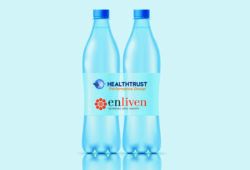The World Health Organization and the United Nations Children’s Fund launched the global Baby-Friendly Hospital Initiative in 1991 “to encourage and recognize hospitals and birthing centers that offer an optimal level of care for infant feeding and mother/baby bonding.” According to the Baby-Friendly USA website (www.babyfriendlyusa.org), 393 U.S. hospitals and birthing centers in 49 states and the District of Columbia hold the Baby-Friendly designation, and each year approximately 772,000 births, or about 19 percent, occur at those facilities.
Hospitals that complete a lengthy program and successfully implement the Ten Steps to Successful Breastfeeding and the International Code of Marketing of Breast-milk Substitutes earn the Baby-Friendly Hospital designation. They set policies and train their staff to help new mothers bond with their infants and take the steps to establish and support the practice of breastfeeding.
There are definite advantages to being a Baby-Friendly hospital, including providing a competitive advantage. The designation can also help provide a consistent message to the community on population health issues, such as the healthy growth and development of infants, protection from infectious diseases and prevention of chronic diseases.
“Being baby-friendly is part of our commitment to the families who choose to deliver at our facility,” says Todd Rumsey, M.D., chairman of the board of the Dupont Hospital in Indiana and a HealthTrust physician advisor. His hospital is currently working its way through the official Baby-Friendly Hospital designation process.
The health benefits associated with breastfeeding are some of the biggest selling points for many Baby-Friendly hospitals. For example, staff in the four Baby-Friendly hospitals that are part of Livonia, Michigan-based Trinity Health are pleased to be tasked with helping mothers establish breastfeeding with their infants. “We know that it gives those babies a gift for a lifetime,” says Susan Garpiel, director of perinatal clinical practice for Trinity Health.
From a supply chain perspective, however, the Baby-Friendly Hospital Initiative can be complicated to execute. According to Nancy Preston, interim director of strategic sourcing clinical products and services for Trinity Health, the initiative essentially required that hospitals change their relationships with the suppliers who sell formula.
In the past, representatives of formula companies would offer a lower price on formula in exchange for the opportunity to market their products to new mothers who were still in the hospital with their babies. Representatives would bring in free products for the nursing staff to hand out to the new moms.
Baby-Friendly hospitals discourage this practice, particularly since it turns nurses into de facto advertisers. So Trinity Health reworked its relationship with the supplier to continue purchasing formula to meet the nutritional needs of infants who are not breastfed for medical or other reasons.
“We are now paying for the formula, and we no longer allow that promotional practice,” says Preston, explaining that the Trinity Health system refers to this as “fair market value purchasing.”
It’s a little tricky, however, because the move to fair market value purchasing challenges hospitals to calculate a fair market price for formula that will meet the requirements of the Baby-Friendly program in balance with the need to contain costs. The program prefers that hospitals determine the fair market price of formula according to their geographic location. But healthcare systems usually purchase discounted products through their group purchasing organization contract in lieu of having their hospitals individually research the cost of formula before making the purchase.
“The initiative is very important, but some of the criteria may need to be reconsidered,” Garpiel adds.
Share Email Facilities Management, Patient Experience, Performance Improvement, Q2 2017





